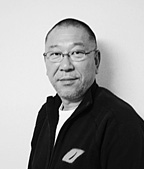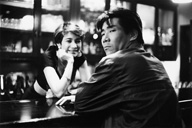Juror
Sai Yoichi
 [Juror’s Statement]
[Juror’s Statement]
As a person whose job is to create stories that exist in the realm of fiction or an unreality of sorts, it is perhaps only natural that I indulge in the illusion of a ‘reality’ formed by the successive layering of fabrication upon fabrication.
During my youth I dedicated myself to the changing tides of time, and believed that the destruction of the old framework and the birth of a new world was not an unachievable dream but a reality. I considered all film that reflected front-line resistance to be simultaneously news and propaganda.
My personal experience tells me that people judge unaffecting or uninspiring news and propaganda as bad information, while a “realistic effect” that appeals to the most rudimentary of human emotions is considered good information. But this premature personalization of media, or the notion of a ‘personal media’, exposes the very fragility of news and propaganda. If one observes the shifting world around us, it is clearly evident that it does not take long for such media to be churned into opportunistic consumerism.
A gigantic agglomeration of mass media is paving the way for a one-dimensional world. Frankly, there is nothing that I find more unpleasant or disgusting as this. Can it not be said that the over-abundance of information spawned from the diversification of media has in turn hindered our ability to select information rationally? Do we not passively accept real-time news—the Iraq war comes to mind—that blurs the boundaries of fiction and reality, and disseminates information as if they are stories of a distant world?
Although it may be too late for soul-searching, if this situation becomes an unchallenged constant in our society, then I feel we should each generate our own ‘reality’ from our ‘personal media’ even if we are criticized for living side-by-side but in separate, individual realities.
This, in a sense, is a personal reversion to my origins. Although it may sound a little too naive coming from a filmmaker who creates fiction, I want to reject the ease of submitting to a one-way system whereby creators give, and the audience takes.
I firmly support those who pursue the limits of film as a memory device as they place the camera beyond the protective veil separating reality and fiction, and those who transform even themselves into objects of reference through the repeated act of filming, in order to grasp a more profound mode of perception.
Born 1949 in Nagano Prefecture, Sai Yoichi was an assistant director to directors Oshima Nagisa and Murakawa Toru before making his directorial debut with A Mosquito on the Tenth Floor (1983). This first effort received much attention with screenings at the Venice International Film Festival and elsewhere. He has since made films including Someone’s Gonna Get Killed Someday (1984), Close Your Eyes Quietly, My Friend (1985), Via Okinawa (1989), All Under the Moon (1993)—winner of some fifty-three awards, Irresponsible Heisei Family: Tokyo Deluxe (1995), and Dog Race (1998). In 1996 he studied at The Korean Language Institute at Yonsei University, and while researching modern Korean film history, he had the opportunity to meet many people in the Korean film industry. Recent works such as Doing Time (2002), Quill (2004) and Blood and Bones (2004) have also garnered much attention. |
All Under the Moon
(“Tsuki wa docchi ni deteiru”) JAPAN / 1993 / Japanese / Color / 35mm (1:1.85) / 109 min
JAPAN / 1993 / Japanese / Color / 35mm (1:1.85) / 109 min
Director: Sai Yoichi
Original Story: Yan So-gil
Script: Chong Ui-shin, Sai Yoichi
Photography: Fujisawa Junichi
Music: Sakuma Masahide
Art Directors: Imamura Tsutomu, Okamura Kyoichi
Cast: Kishitani Goro, Ruby Moreno, Ezawa Moeko
Producers: Ri Bong-ou, Aoki Katsuhiko
Source: Cine Qua Non, The Japan Foundation
Production Company: Cine Qua Non
Kang Chung-nam, a zainichi Korean taxi driver, is surrounded by episodes of tragicomedy every day. Although he wins over a stuck-up Filipina whom he met by chance, the romance is not as straightforward as expected. This masterpiece that took the Japanese film industry by storm is directed by Sai Yoichi, himself a second-generation zainichi Korean. Sai explored the zainichi theme for the first time in his career with this film.
